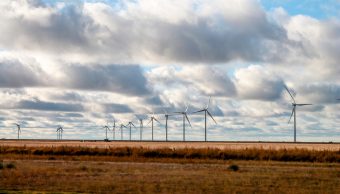
Wind power has played a major role in cutting UK carbon emissions, preventing the creation of almost 36 million tonnes of greenhouse gas emissions from fossil fuel sources over the six years up to 2014, a new analysis has found.
The study, published today in the journal Energy Policy by engineering researchers from the University of Edinburgh, analysed National Grid figures between 2008 and 2014 to assess the power generated by various electricity sources such as wind, coal and gas.
The results show wind farms have made a significant impact in limiting carbon emissions from other sources of power generation in Great Britain, saving the emissions equivalent to taking 2.3 million cars off the road over the six year period.
The study comes after the UK wind industry last week set a new output record of over 10,000MW, delivering 23 per cent of Britain’s total electricity demand for half an hour on Thursday afternoon.
According to the authors, the new study suggests a greater investment in wind energy could help meet Scottish and UK emission reduction targets.
“Until now, the impact of clean energy from wind farms was unclear,” said Dr Camilla Thomson, a carbon footprinting specialist from the University of Edinburgh, who led the study. “Our findings show that wind plays an effective role in curbing emissions that would otherwise be generated from conventional sources, and it has a key role to play in helping to meet Britain’s need for power in future.”
The study indicated that government estimates for carbon savings may have underplayed the benefits from wind farms, with the findings showing 3.4 million tonnes more greenhouse gases were saved than previously thought.
The researchers claim the study is the most accurate of its kind to date as it uses real rather than estimated energy output figures, while also taking the inefficiency of individual conventional generators into account. The detailed data produced in the study shows output figures for every half hour, showing how demand over time was met by power from the various sources.
Green groups welcomed the study, with Lang Banks, director of WWF Scotland saying it shows more clearly than ever just how significant the contribution from wind power and other renewables really is.
“It’s great to finally have an independent and authoritative study that puts a more accurate figure on the massive amounts of climate-damaging carbon emissions being avoided thanks to wind power,” he said in a statement. “The figures in the study highlight just one example of the many benefits that have come from shifting our electricity system to a clean renewable one.
“However, with electricity generation accounting for less than a quarter of our climate change emissions, it’s now time to begin to reap the same benefits by increasing the use of renewables in our heat and transport sectors,” Banks added, urging the Scottish government to increase its 2030 renewables target to 50 per cent of all energy.
Source: businessgreen.com



